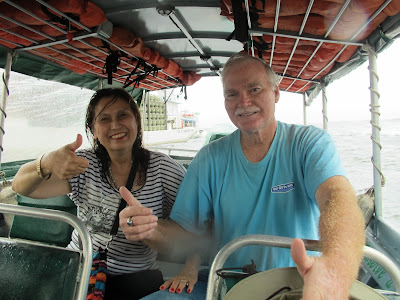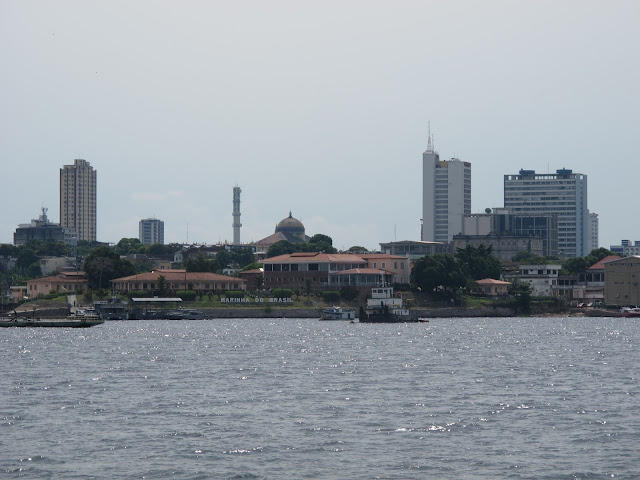The
Eco Lodge reminds me of the lodge we stayed at in Taman Negara, Malaysia – it
is on the river shore and is thick with tropical plants. Unlike the Taman
Negara however he have not seen exotic animals in the premises. (In Malaysia we had seen wild tapirs and an angry wild elephant in the lodge area. The angry
elephant incident has lapsed into lore since nothing bad actually happened, but
one night, coming back to our cottages, we ran into an irate elephant who was
uprooting palms trees and bushes; staff people gathered a group of us and hid
us in a building. Peering out a window, we saw this pissed-off elephant having
a rampage.)
Yesterday,
we took a boat ride to the monkey island, a refuge for rescue monkeys. We saw
some wooly monkeys with their babies, and a solitary red monkey who does not
exactly belong to the group but is tolerated as long as she stays in the
periphery. Monkeys always amuse me since I grew up with monkeys; we used to
have one chained on a bamboo pole, and later, we had around ten of them running
around freely in our huge yard; they used to fight the dogs – but that’s
another story.)
In
the evening we went on another boat ride to find a caiman, which looks like an alligator. We trolled around the river, with one of our boat men
flashing a huge light onto the water. He eventually found a baby caiman, just
one-year old, in shallow water, and our guide Marjit held it in her hands and
gave a long talk about caimans. We got to take pictures of the terrified
animal, and even had pictures taken with it. I was not crazy about the idea and
thought only of how scared the baby caiman was. It was eventually released
and hopefully no damage done to it except for the psychological. (It will never
be caught again – ever, because their memories are excellent. Marjit said a
caiman is very patient and will visit and revisit areas where say human beings
are before actually attacking. Consequently, if the indigenous people see it
once, they will kill it before it returns to kill one of them.)
Today,
Marjita gave a brief talk on a particular fruit with clusters of red seeds, which is used for red dye; it apparently cures
diabetes as well. And we stopped by an ant mound attached to a tree; the ants
are very aggressive; if crushed and rubbed on your body, they give off an odor
that frightens other bugs.
In
the evening there is little to do as the cottages have no TV,
radio, nor wifi. Lauren has his kindle and I have my writing notebook, my laptop, and books to read. Wifi connection is
sporadic here in the Amazon jungle and is sometimes available only in the restaurant area.
There
are around 15 guests, including Brazilians, Germans, English, Ethiopians. Everyone
tends to be quiet and private and there is little social interaction in the
restaurant or bar/lobby. It is thankfully not hot nor too humid in this
jungle; Malaysia was a more intense jungle experience.
This is where we went on a boat cruise. It was our last day in Manaus and we had to go to the airport that afternoon. While on the boat, it started to rain, and when the motorboat picked us up to get us to a van and on to the airport, the weather got pretty bad. The river became very choppy. The boatman was unprepared for the rain (I think) and when we got on that motorboat, and as he sped along, the waves washed in and drenched us and our suitcases.
Never mind, we survived, and we also survived a harrowing landing in Salvador when the pilot had to abort the first landing because of a very wet runway. A number of women pulled out their rosaries to pray, as I did, and thankfully, we did land safely.
To those who have emailed me, internet was not always available in Manaus and is terribly slow in Salvador where we are. Thank you and I'll get back to you when the internet is faster. And, dear Readers, be patient with me if I have mistakes, grammatical errors, etc. internet is slow and I can't take too much time editing, etc.
The top picture shows us wet in that motorboat to catch our flight to Salvador. There are pictures taken at the monkey island, our visit to an indigenous village, Manaus from the river, the meeting of the waters, our cottage, Lauro the resident macaw at the Lodge, and one in which I'm trying out a hammock. There is also a picture of an indigenous Amazonian working with manac, and another with rubber. (The wealthy rubber barons of the early 1900s became bankrupt when England stole rubber tree seeds and started rubber plantations in Malaysia.)
Read also
- More New Pictures of Manaus & Salvador, Brazil
- Random Pictures of Buenos Aires, Argentina
- Blue Dollars and Arbolitos in Buenos Aires, Argentina
- Foz do Iguazu, Mighty Falls of Brazil and Argentina
- Falling in Love with Rio de Janeiro
- NBA Star, Anderson Varejao in Copacabana, Rio de Janeiro, Brazil
- Mariana and Ouro Preto, Colonial Towns in Minas Gerais, Brazil
- The Old Mining Towns of Minas Gerais, Brazil
- Pelourinho Historic District, Salvador, Brazil
- Salvador, Brazil - the Center of Bahian Culture
- Where the Waters Meet - Manaus, Brazil
- The Link to the Amazon - Manaus, Brazil
- Coming Up: Brazil
- Where Enrique of Malacca Came From - Malaysia
- Random Travel Pictures - How Great Are Your Works
- Fascinating Faces of the World, photos by Cecilia Brainard
- Burma Moving Forward
- Up Close and Personal with the Bongo - Kenya
- From Hanoi to Ho Chi Minh City
- My Love Affair with France
Cecilia
tags: Brazil, Manaus, Amazon, travel, holiday, tourism, Rio Negro, Rio Selimoes, Meeting of Waters









































No comments:
Post a Comment